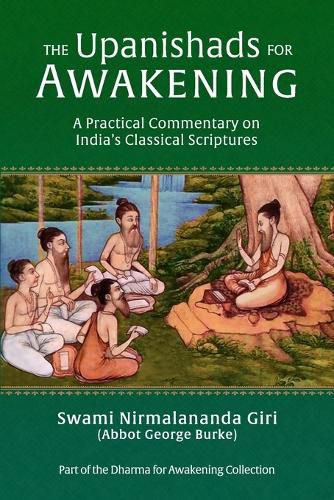Readings Newsletter
Become a Readings Member to make your shopping experience even easier.
Sign in or sign up for free!
You’re not far away from qualifying for FREE standard shipping within Australia
You’ve qualified for FREE standard shipping within Australia
The cart is loading…






With penetrating insight, Abbot George Burke illumines the Upanishads’ practical value for spiritual seekers. With a unique perspective from a lifetime of study and practice of both Eastern and Western spirituality, he presents the treasures of the Upanishads in an easily intelligible fashion.
The sacred scriptures of India are vast. Yet they are only different ways of seeing the same thing, the One Thing which makes them both valid and ultimately harmonious. That unifying subject is Brahman: God the Absolute, beyond and besides whom there is no other whatsoever. The thirteen major Upanishads are the fountainhead of all expositions of Brahman. The word upanishad itself comes from the root word upasana, which means to draw or sit near, and is usually considered to mean that which was heard when the student sat near the teacher to learn the eternal truths.
We do not know who wrote the Upanishads. This has a distinct advantage in that the image of a historical, finite personality does not intervene to obscure the revelation handed on to spiritual aspirants. The authority of the Upanishads rests not upon those who wrote them, but upon the demonstrable truths they express. They are as self-sufficient and self-evident as the multiplication tables or the Table of Elements. They are simply the complete and unobscured truth. And realization of that Truth alone matters.
$9.00 standard shipping within Australia
FREE standard shipping within Australia for orders over $100.00
Express & International shipping calculated at checkout
With penetrating insight, Abbot George Burke illumines the Upanishads’ practical value for spiritual seekers. With a unique perspective from a lifetime of study and practice of both Eastern and Western spirituality, he presents the treasures of the Upanishads in an easily intelligible fashion.
The sacred scriptures of India are vast. Yet they are only different ways of seeing the same thing, the One Thing which makes them both valid and ultimately harmonious. That unifying subject is Brahman: God the Absolute, beyond and besides whom there is no other whatsoever. The thirteen major Upanishads are the fountainhead of all expositions of Brahman. The word upanishad itself comes from the root word upasana, which means to draw or sit near, and is usually considered to mean that which was heard when the student sat near the teacher to learn the eternal truths.
We do not know who wrote the Upanishads. This has a distinct advantage in that the image of a historical, finite personality does not intervene to obscure the revelation handed on to spiritual aspirants. The authority of the Upanishads rests not upon those who wrote them, but upon the demonstrable truths they express. They are as self-sufficient and self-evident as the multiplication tables or the Table of Elements. They are simply the complete and unobscured truth. And realization of that Truth alone matters.